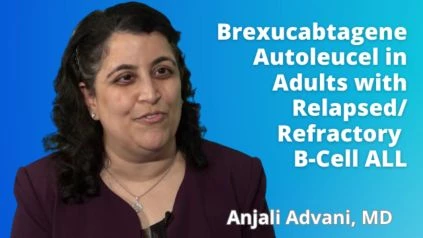Date: 12/06/2023
Dive into this insightful conversation with Dr. Anjali Advani, a distinguished medical oncologist and professor specializing in hemologic oncology and blood disorders at the Cleveland Clinic. Dr. Advani serves as the director of the inpatient leukemia program at the Tosset Cancer Institute. The discussion centers around groundbreaking research on Brexucabtagene Autoleucel therapy in adults with relapse refractory cells.
Opening the conversation, Allen introduces Dr. Advani and expresses gratitude for her presence on the show. The dialogue delves into the significant response rates observed in adults treated with Brexucabtagene Autoleucel therapy. Dr. Advani emphasizes the real-world implications of these outcomes, shedding light on the potential for increased durability in CAR T-cell therapies.
The interview takes a turn to address the occurrence of severe side effects, specifically eye concerns, in a notable percentage of patients. Dr. Advani discusses the potential correlation between tumor burden and these side effects, suggesting that reducing tumor burden might mitigate such adverse events. She also highlights ongoing efforts to use prophylactic treatments to prevent eye concerns.
Moving on, the conversation explores the high percentage of patients achieving morphologic complete response and minimal residual disease negativity. Dr. Advani commends the efficacy of Brexucabtagene Autoleucel therapy, emphasizing the importance of considering response metrics in treatment decisions. The discussion touches upon factors like durability of response, toxicity, and patient preferences, providing a comprehensive view of the considerations in selecting an appropriate treatment.
The interview takes a deeper dive into the study’s findings on post-card consolidation maintenance therapy, particularly allogeneic hematopoietic stem cell transplant (HCT) and its impact on progression-free survival. Dr. Advani explains the significance of these findings, suggesting that some form of maintenance therapy after CAR T-cell treatment appears beneficial. She acknowledges the need for further research and clarifies that the specific CAR T-cell used may influence the necessity of consolidation therapies.
As the interview concludes, Allen and Dr. Advani discuss the emerging role of consolidation maintenance therapies in enhancing response durability post-Brexucabtagene Autoleucel. They touch on the considerations for individual patients, especially those achieving negative responses. Dr. Advani emphasizes the importance of consolidation approaches even in patients with minimal residual disease negativity, hinting at potential variations based on the method of measuring MRD.
In closing, Allen expresses gratitude for Dr. Advani’s insights, acknowledging the complexity of the discussion. Dr. Advani appreciates the opportunity and compliments Allen on his handling of the interview, creating a positive and informative exchange for the audience.

